In my opinion, fellow anons, we've neglected our study of our ideological ancestors. In fact, general discussion of politics, outside of the occasional mention of Mr. H, has tended to fall by the wayside as we've pressed our noses too much in contemporary news. I intend to change that.
Please post pictures and summaries of lesser-known statesmen, philosophers, and activists of the Right. Specific ideology doesn't matter (that is, whether they are traditionalist, libertarian, fascist, or national socialist), but they need to be esoteric enough that their names don't pop up very often in an imageboard. To build a new future we must first learn from our forebears:
Three to start us off:
Gabriel García Moreno
Sources: http://www.newadvent.org/cathen/06379b.htm
https://www.thoughtco.com/gabriel-garcia-moreno-ecuadors-catholic-crusader-2136633
Stance: Radical Catholic Traditionalist
Lifespan: 1821-1875
Educated in law, Moreno was the most vocal critic of the liberal regime in Ecuador, which had started to fall apart (as South American countries were apt to do) after declaring independence from Spain. As a highly intelligent conservative he was forced into exile in 1849. Europe was also in a rough shape after the latest liberal revolutions, which further galvanized Moreno into halting the decline of Western civilization. Upon his return to Ecuador he secured asylum for the Jesuits and became the greatest advocate of the holy order. His newspaper was suppressed and he was exiled again; upon his return, he was not allowed to take a senate seat despite being elected. After studying political and physical science in Paris Moreno returned, was granted amnesty, and became rector of the University of Quito. He reentered politics, served on the senate, and published a new anti-government paper.
In 1860 Moreno, seeing the time to act, led a revolution and took control of the presidency, and then successfully fought a civil war. Now in power, Moreno revitalized education, established the Church as the state religion, and openly pledged his country to the Vatican (he was the only head of state to protest the occupation of Rome by the troops of King Victor Emmanuel). As the presidential dictator of Ecuador, he also encouraged a large degree of economic growth and fought against the large neighbor of Columbia twice.
Moreno's practically theocratic policies made deadly enemies of the liberals, particularly the Freemason lodges active in Ecuador. The president eschewed personal protection, anticipating assassination as martyrdom. He was accosted and killed on August 6, 1875, by assassins with machetes and revolvers. Unfortunately, there was no worthy successor to Moreno and Ecuador devolved into the stagnant nowhere it is today. Had Moreno lived longer and planned further ahead, Ecuador could have become a surprising powerhouse in South America.
Engelbert Dollfuß
Sources (sorry, all I could find): https://thewarforchristendom.wordpress.com/2015/07/25/engelbert-dollfuss-fascist-or-hero/
https://nekropole.info/en/Engelbert-Dollfu
https://www.youtube.com/watch?v=E7SwFcQal4w [in German]
https://angeluspress.org/products/dollfuss-austrian-patriot
Stance: Austrofascist
Lifespan: 1892-1934
It's rather sad that Dollfuss is relatively unknown even in alt-right circles, considering his aspirations and significance in his home country. An officer of the Imperial and Royal Army in WW1, Dollfuss was left with a shattered and depressed Empire. After working in the Agricultural Ministry he was appointed President of the Federal Railways in 1930. Amidst a political crisis in 1932 Dollfuss was appointed Chancellor of Austria. To counter the rise of socialism and National Socialism (which was in favor of Anschluss) he established the Fatherland Front, a fascist party dedicated to the preservation of Austria.
In order to protect Austria from the dual threats of Marxism and National Socialism, Dollfuss banned their respective parties, suppressed a socialist revolution, and declared Austria a federal state, with the eventual goal of reestablishing the Holy Roman Empire with a legitimate Habsburg monarchy. Despite having amiable relations with Italy, an independent Austria was against the pan-nationalist goals of the NSDAP. On July 25, 1934, ten assassins disguised as soldiers shot him dead.
Ol' Engelbert would probably be considered a controversial figure here, a hero to some and a stumbling-block to others. As an Austrian nationalist, versus a German pan-nationalist, he desired independence for his country and a possible reclamation of Imperial lands. He was a true fascist but held disparate views to national socialism, believing the latter to be totalitarian and antithetical to Christian values. Had Dollfuss survived and Anschluss was averted, what would be the fate of Austria–and Europe–in WW2? If Hitler had successfully invited Austria into the Axis, would victory be more likely, or would an isolationist Austria have fared better as a bastion of tradition and Catholicism?
/mlpol/ - My Little Politics
Archived thread
Julius Evola
Sources: https://www.youtube.com/watch?v=4YqKf3v2aPs (really good video)
http://www.juliusevola.com/
Stance: "Super-Fascist;" Radical Traditionalist
Lifespan: 1898-1974
Also known as the "most right-wing thinker" who ever lived, Evola is one of the central ideological ancestors of the alt-right as a concept, despite being rarely discussed outside its more radical fringes. My initial thoughts (forgive me) were that he was a sperg who thought of rape as "natural" and was a neo-pagan LARPer, but upon further investigation he is a very interesting figure who holds surprisingly similar views to me and most of us.
Evola was a Sicilian baron who studied engineering, but intentionally did not complete his studies to avoid "bourgeois academics." In WW1 he was an artillery officer and afterwards became involved in Dadaism. He was deeply entranced by the occult: despite dismissing Eastern religions as "inferior" to Western superstition, he wrote extensively on Hinduism and Buddhism, particularly its more violent (left-hand) aspects. In 1927 he and other occultists founded the Ur Group, which revived ancient Roman religion and sought to use spiritual power to influence the real world (basically a form of "meme magic"). Despite occasional criticisms of Italian fascism and German national socialism (from the right, no less), he was supported by Mussolini although the SS considered him dangerous. Evola believed that the thrill of danger elevates one spiritually, and so went for strolls during air raids: this paralyzed him in 1945. He continued writing after the war and was a major influence for neo-fascists.
An opponent of the Catholic Church, Evola advocated that fascism restore the pagan values and aristocratic structure of antiquity. His ideal society would be one in which warriors expressed spiritual power. He advocated war, but was disgusted by the industrialized bloodshed of modern conflicts, wishing instead for a time when warriors could face each other with skill and valor (almost Quixotic in his tone). Evola was also deeply spiritual and believed in an eternal order that a hierarchical, traditionalist society could adhere to, though specific tenets were irrelevant to him (Evola was religiously indifferent in this way). He rejected both capitalism and socialism, viewing them as overly materialistic and "ruled by merchants" when in his view society should be governed by warriors. Such a society would be hyper-masculine with every aspect of masculinity pronounced. Also, Evola rejected technology and the concept of steady "progress," preferring instead hyper-spirituality that would lead to one becoming a "god-man."
Interestingly, Evola claimed to be anti-individualism and yet he celebrates the "absolute individual" and his achievements: he abhors almost every collectivist grouping of man. He hated the bureaucratic state for replacing ancient hierarchies and reducing Man to a pawn, he disliked the Church for letting worship be performed by a group through clergy as intermediaries, and he even dissented with the race politics of Hitler to some degree. To him, the most spiritual and traditional path of Man was as a warrior and a risk-taker: fighting in close personal combat, living on one's own, and climbing mountains. Perhaps it is Max Stirner's influence showing through, but Evola breaks the "horseshoe theory" which claims the extreme-right is inevitably more collectivist.
Evola was an active nihilist: he thought that the fight against modernity was lost, so the traditionalist should "ride the tiger" until modern decadence collapses and right-wing anarchism prevails. Rejecting nationalism, Evola also wanted a united Europe but one that is organic, hierarchical, anti-democratic, and anti-individualism: basically the opposite of the modern EU. Most importantly, hierarchy in all things was central to him: man over woman, sacred leaders over warriors over bourgeoisie over slaves, Europeans over Easterners over Africans (though, he acknowledged, they also have merits on their own).
In conclusion, Evola seems to have an extremely paradoxical worldview which strangely makes sense once you try to understand him. You can disagree utterly with his ideas, think he's borderline insane, but as long as you have an innate respect for tradition you will grow to respect him and identify partially with his ideals. I stress "partially" because Evola is so extreme that no other individual can genuinely closely match him. His books are on my reading list.
Sources: https://www.youtube.com/watch?v=4YqKf3v2aPs (really good video)
http://www.juliusevola.com/
Stance: "Super-Fascist;" Radical Traditionalist
Lifespan: 1898-1974
Also known as the "most right-wing thinker" who ever lived, Evola is one of the central ideological ancestors of the alt-right as a concept, despite being rarely discussed outside its more radical fringes. My initial thoughts (forgive me) were that he was a sperg who thought of rape as "natural" and was a neo-pagan LARPer, but upon further investigation he is a very interesting figure who holds surprisingly similar views to me and most of us.
Evola was a Sicilian baron who studied engineering, but intentionally did not complete his studies to avoid "bourgeois academics." In WW1 he was an artillery officer and afterwards became involved in Dadaism. He was deeply entranced by the occult: despite dismissing Eastern religions as "inferior" to Western superstition, he wrote extensively on Hinduism and Buddhism, particularly its more violent (left-hand) aspects. In 1927 he and other occultists founded the Ur Group, which revived ancient Roman religion and sought to use spiritual power to influence the real world (basically a form of "meme magic"). Despite occasional criticisms of Italian fascism and German national socialism (from the right, no less), he was supported by Mussolini although the SS considered him dangerous. Evola believed that the thrill of danger elevates one spiritually, and so went for strolls during air raids: this paralyzed him in 1945. He continued writing after the war and was a major influence for neo-fascists.
An opponent of the Catholic Church, Evola advocated that fascism restore the pagan values and aristocratic structure of antiquity. His ideal society would be one in which warriors expressed spiritual power. He advocated war, but was disgusted by the industrialized bloodshed of modern conflicts, wishing instead for a time when warriors could face each other with skill and valor (almost Quixotic in his tone). Evola was also deeply spiritual and believed in an eternal order that a hierarchical, traditionalist society could adhere to, though specific tenets were irrelevant to him (Evola was religiously indifferent in this way). He rejected both capitalism and socialism, viewing them as overly materialistic and "ruled by merchants" when in his view society should be governed by warriors. Such a society would be hyper-masculine with every aspect of masculinity pronounced. Also, Evola rejected technology and the concept of steady "progress," preferring instead hyper-spirituality that would lead to one becoming a "god-man."
Interestingly, Evola claimed to be anti-individualism and yet he celebrates the "absolute individual" and his achievements: he abhors almost every collectivist grouping of man. He hated the bureaucratic state for replacing ancient hierarchies and reducing Man to a pawn, he disliked the Church for letting worship be performed by a group through clergy as intermediaries, and he even dissented with the race politics of Hitler to some degree. To him, the most spiritual and traditional path of Man was as a warrior and a risk-taker: fighting in close personal combat, living on one's own, and climbing mountains. Perhaps it is Max Stirner's influence showing through, but Evola breaks the "horseshoe theory" which claims the extreme-right is inevitably more collectivist.
Evola was an active nihilist: he thought that the fight against modernity was lost, so the traditionalist should "ride the tiger" until modern decadence collapses and right-wing anarchism prevails. Rejecting nationalism, Evola also wanted a united Europe but one that is organic, hierarchical, anti-democratic, and anti-individualism: basically the opposite of the modern EU. Most importantly, hierarchy in all things was central to him: man over woman, sacred leaders over warriors over bourgeoisie over slaves, Europeans over Easterners over Africans (though, he acknowledged, they also have merits on their own).
In conclusion, Evola seems to have an extremely paradoxical worldview which strangely makes sense once you try to understand him. You can disagree utterly with his ideas, think he's borderline insane, but as long as you have an innate respect for tradition you will grow to respect him and identify partially with his ideals. I stress "partially" because Evola is so extreme that no other individual can genuinely closely match him. His books are on my reading list.
Oh boy, I love obscure right wing figures. I can think of quite a lot right now. I already knew two of these figures. The other fails me since I am majorly ignorant of most of South American groups.
Here's Plínio Salgado of the Brazilian Integralists. Who preached a far more fascistic and social alternative to the Vargas Regime. Although supportive of him, he was eventually snuffed and exiled to Portugal. There's much more on him, but I'll save the rest later when I stop being lazy and learn the formatting.
>>98376
>Evola
>obscure
>>98375
To answer some of your questions:
>Had Dollfuss survived and Anschluss was averted, what would be the fate of Austria–and Europe–in WW2?
Probably not much different. Either Austria would be conquered by the Allies, stayed neutral like Spain, or anything in between; Austria would have been a non-factor without being under the Reich. It just means with less landmass, Germany has less logistic capability.
>If Hitler had successfully invited Austria into the Axis, would victory be more likely, or would an isolationist Austria have fared better as a bastion of tradition and Catholicism?
No. Dolfuss' economy was inferior before annexation, thus a belligerent ally wouldn't serve any much more of an advantage. Again, less logistic capability. Think of Romania for a comparison, Austria would just be riding off the coattails of Germany or Italy. Many of the Austrians cheered for the Anschluss as they expected living quality to improve, and it did. As for an isolationist Austria, provided that the war doesn't go to an Allies victory (which in that case Austria fares as much as Spain), then you would be right. And, Italy could fall under the same description. It's not like any other Fascist country wasn't a bastion of tradition, it's just some are Catholic or Protestant.
Here's Plínio Salgado of the Brazilian Integralists. Who preached a far more fascistic and social alternative to the Vargas Regime. Although supportive of him, he was eventually snuffed and exiled to Portugal. There's much more on him, but I'll save the rest later when I stop being lazy and learn the formatting.
>>98376
>Evola
>obscure
>>98375
To answer some of your questions:
>Had Dollfuss survived and Anschluss was averted, what would be the fate of Austria–and Europe–in WW2?
Probably not much different. Either Austria would be conquered by the Allies, stayed neutral like Spain, or anything in between; Austria would have been a non-factor without being under the Reich. It just means with less landmass, Germany has less logistic capability.
>If Hitler had successfully invited Austria into the Axis, would victory be more likely, or would an isolationist Austria have fared better as a bastion of tradition and Catholicism?
No. Dolfuss' economy was inferior before annexation, thus a belligerent ally wouldn't serve any much more of an advantage. Again, less logistic capability. Think of Romania for a comparison, Austria would just be riding off the coattails of Germany or Italy. Many of the Austrians cheered for the Anschluss as they expected living quality to improve, and it did. As for an isolationist Austria, provided that the war doesn't go to an Allies victory (which in that case Austria fares as much as Spain), then you would be right. And, Italy could fall under the same description. It's not like any other Fascist country wasn't a bastion of tradition, it's just some are Catholic or Protestant.
1514852630.png (323.9 KB, 1600x1559, twilight_sparkle__by_thatg….png)

Bumping because I'm not letting 4 hours go to waste. Also, stop being historically illiterate.
I love this sort of thing
It's funny how mainstream support for fascism was in the early 20th century compared to today. I was reading about a romanian nihilist philosopher emil cioran whose basic struggle was about not committing suicide, he made some surprisingly positive comments about the iron guard.
Then there's this guy, who influenced writers associated (from wikipedia) "with modernism, existentialism, black comedy and the Beat Generation". Obviously none of these things sound very fascist in the slightest, but I think it's just that in the last 70 years society has been discouraged about actually learning what fascism is, instead keeping it as a vague goldfinger-like force with connotations of malice.
It's funny how mainstream support for fascism was in the early 20th century compared to today. I was reading about a romanian nihilist philosopher emil cioran whose basic struggle was about not committing suicide, he made some surprisingly positive comments about the iron guard.
Then there's this guy, who influenced writers associated (from wikipedia) "with modernism, existentialism, black comedy and the Beat Generation". Obviously none of these things sound very fascist in the slightest, but I think it's just that in the last 70 years society has been discouraged about actually learning what fascism is, instead keeping it as a vague goldfinger-like force with connotations of malice.
9 replies | 10 files | 1 UUIDs | Archived
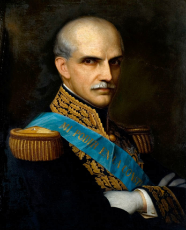
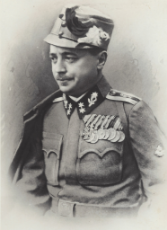

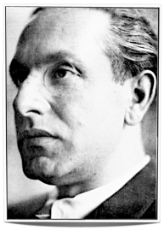
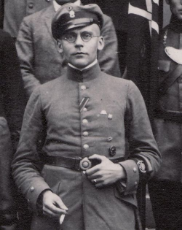
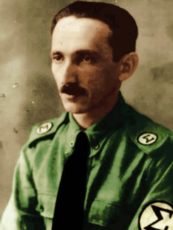


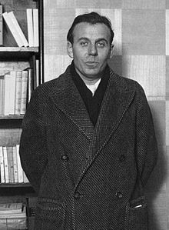
 Ex: Type :littlepip: to add Littlepip
Ex: Type :littlepip: to add Littlepip  Ex: Type :eqg-rarity: to add EqG Rarity
Ex: Type :eqg-rarity: to add EqG Rarity 